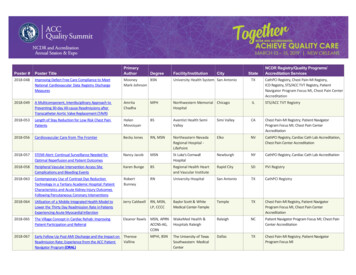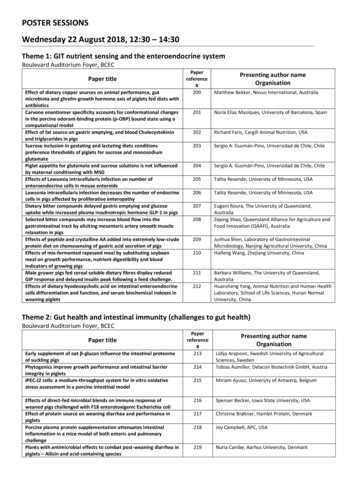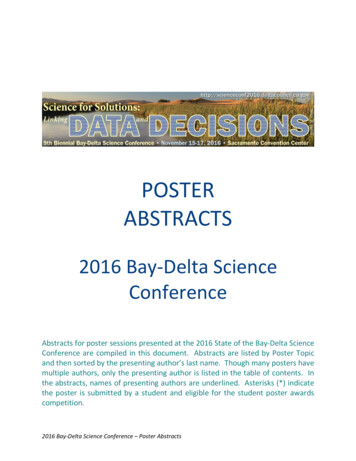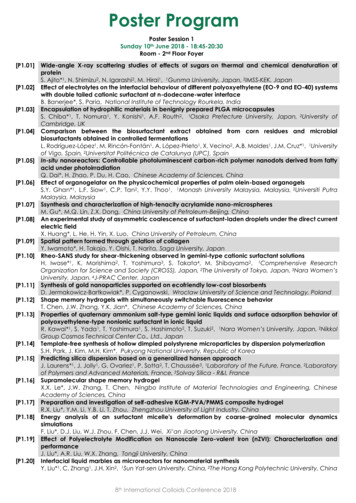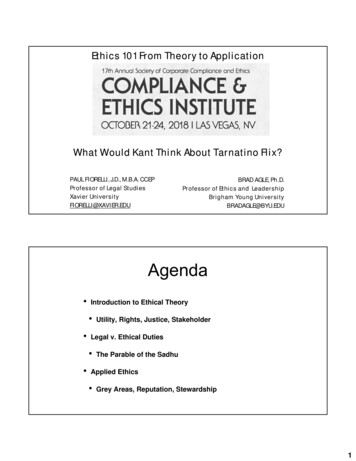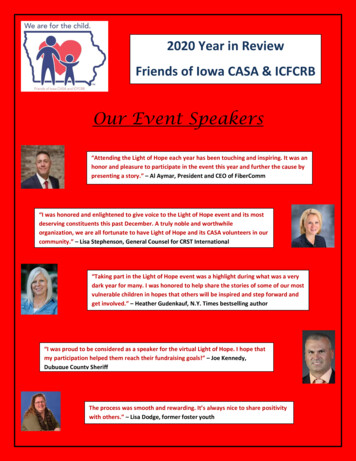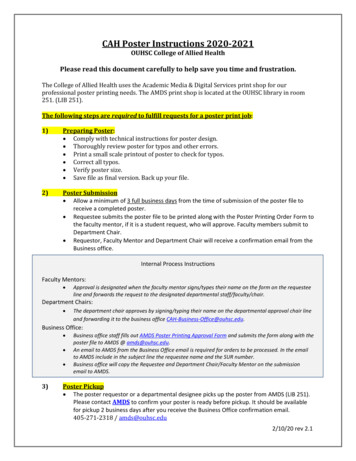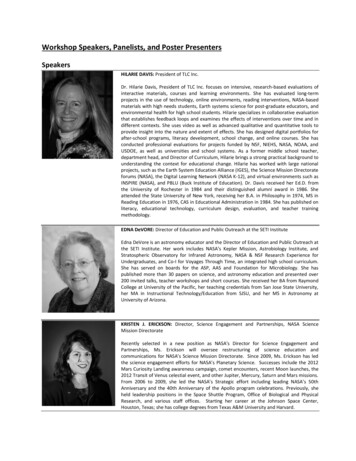
Transcription
Workshop Speakers, Panelists, and Poster PresentersSpeakersHILARIE DAVIS: President of TLC Inc.Dr. Hilarie Davis, President of TLC Inc. focuses on intensive, research-based evaluations ofinteractive materials, courses and learning environments. She has evaluated long-termprojects in the use of technology, online environments, reading interventions, NASA-basedmaterials with high needs students, Earth systems science for post-graduate educators, andenvironmental health for high school students. Hilarie specializes in collaborative evaluationthat establishes feedback loops and examines the effects of interventions over time and indifferent contexts. She uses video as well as advanced qualitative and quantitative tools toprovide insight into the nature and extent of effects. She has designed digital portfolios forafter-school programs, literacy development, school change, and online courses. She hasconducted professional evaluations for projects funded by NSF, NIEHS, NASA, NOAA, andUSDOE, as well as universities and school systems. As a former middle school teacher,department head, and Director of Curriculum, Hilarie brings a strong practical background tounderstanding the context for educational change. Hilarie has worked with large nationalprojects, such as the Earth System Education Alliance (IGES), the Science Mission Directorateforums (NASA), the Digital Learning Network (NASA K-12), and virtual environments such asINSPIRE (NASA), and PBLU (Buck Institute of Education). Dr. Davis received her Ed.D. fromthe University of Rochester in 1984 and their distinguished alumni award in 1986. Sheattended the State University of New York, receiving her B.A. in Philosophy in 1974, MS inReading Education in 1976, CAS in Educational Administration in 1984. She has published onliteracy, educational technology, curriculum design, evaluation, and teacher trainingmethodology.EDNA DeVORE: Director of Education and Public Outreach at the SETI InstituteEdna DeVore is an astronomy educator and the Director of Education and Public Outreach atthe SETI Institute. Her work includes NASA’s Kepler Mission, Astrobiology Institute, andStratospheric Observatory for Infrared Astronomy, NASA & NSF Research Experience forUndergraduates, and Co-I for Voyages Through Time, an integrated high school curriculum.She has served on boards for the ASP, AAS and Foundation for Microbiology. She haspublished more than 30 papers on science, and astronomy education and presented over200 invited talks, teacher workshops and short courses. She received her BA from RaymondCollege at University of the Pacific, her teaching credentials from San Jose State University,her MA in Instructional Technology/Education from SJSU, and her MS in Astronomy atUniversity of Arizona.KRISTEN J. ERICKSON: Director, Science Engagement and Partnerships, NASA ScienceMission DirectorateRecently selected in a new position as NASA's Director for Science Engagement andPartnerships, Ms. Erickson will oversee restructuring of science education andcommunications for NASA’s Science Mission Directorate. Since 2009, Ms. Erickson has ledthe science engagement efforts for NASA’s Planetary Science. Successes include the 2012Mars Curiosity Landing awareness campaign, comet encounters, recent Moon launches, the2012 Transit of Venus celestial event, and other Jupiter, Mercury, Saturn and Mars missions.From 2006 to 2009, she led the NASA’s Strategic effort including leading NASA’s 50thAnniversary and the 40th Anniversary of the Apollo program celebrations. Previously, sheheld leadership positions in the Space Shuttle Program, Office of Biological and PhysicalResearch, and various staff offices. Starting her career at the Johnson Space Center,Houston, Texas; she has college degrees from Texas A&M University and Harvard.
GORDON KINGSLEY: Associate Professor, School of Public Policy, Georgia TechDr. Kingsley’s research explores the development and implementation of effectivepartnerships across the public, private and non-profit sectors. Current research projectsexamine the impact of partnerships on 1) organization structure; 2) the development andallocation of scientific and technical human capital; 3) the transfer of knowledge acrossprojects, teams, and partner organizations; and 4) the use of communities of practice tosupport organization learning and performance. His work focuses upon three policydomains: higher education innovation, STEM education and engineering design oftransportation systems. This work is currently supported by the Bill and Melinda GatesFoundation, the National Science Foundation, and the Georgia Department ofTransportation. Dr. Kingsley teaches classes in public management, business-governmentrelations, policy implementation, and STEM education policy.JOHN MATHER: Senior Astrophysicist in the Observational Cosmology Laboratory, NASAGoddard Space Flight CenterDr. John C. Mather is a Senior Astrophysicist in the Observational Cosmology Laboratory atNASA's Goddard Space Flight Center. His research centers on infrared astronomy andcosmology. As an NRC postdoctoral fellow at the Goddard Institute for Space Studies, he ledthe proposal efforts for the Cosmic Background Explorer, and came to GSFC to be the StudyScientist, Project Scientist, and also the Principal Investigator for the Far IR AbsoluteSpectrophotometer (FIRAS) on COBE. He showed that the cosmic microwave backgroundradiation has a blackbody spectrum within 50 ppm. As Senior Project Scientist for the JamesWebb Space Telescope, he leads the science team, and represents scientific interests withinthe project management. He has served on advisory and working groups for the NationalAcademy of Sciences, NASA, and the NSF (for the ALMA, the Atacama Large MillimeterArray, and for the CARA, the Center for Astrophysical Research in the Antarctic). He hasreceived many awards including the Nobel Prize in Physics, 2006, for his precisemeasurements of the cosmic microwave background radiation using the COBE satellite.WILLIAM PENUEL: Professor of Educational Psychology and Learning Sciences at theUniversity of Colorado BoulderBill Penuel is Professor of Educational Psychology and Learning Sciences. He joined thefaculty in the School of Education at the University of Colorado Boulder in 2011. He wasformerly the Director of Evaluation Research at the Center for Technology in Learning at SRIInternational, where he developed a broad program of education research in STEMeducation. His current research focuses on teacher learning and organizational processesthat shape the implementation of educational policies, school curricula, and afterschoolprograms. He examines learning and development from sociocultural, social capital, andcomplex social systems perspectives. Two of Dr. Penuel’s current projects, Synergies and theLongitudinal Study of Connected Learning, are examining how children’s interests developover time and across different kinds of settings. He recently edited two National Society forthe Study of Education Yearbooks: Learning Research as a Human Science (2010) andDesign-Based Implementation Research (2013). Dr. Penuel serves on the editorial board forTeachers College Record, American Journal of Evaluation, and Cognition and Instruction.
LAURA PETICOLAS: Science Education and Public Outreach Forum Lead for Heliophysics,University of California, BerkeleyDr. Peticolas is Director of Multiverse, housed at the Space Sciences Laboratory at Universityof California Berkeley. She has been studying the aurora (on Earth, Mars, and Io) andteaching physics to undergraduates, K-12 teachers, and the public for over 10 years. She hasled NASA large-scale and small-scale Education and Public Outreach (E/PO) programs such asthe E/PO efforts for FAST, STEREO, Wind, and RHESSI. She currently leads an effort tocoordinate and support the Heliophysics E/PO programs and projects of NASA's ScienceMission Directorate (SMD) and co-leads NASA’s MAVEN to Mars satellite mission E/POprogram. She also works with the Indigenous Education Institute (IEI) and ‘Imiloa AstronomyCenter on an NSF informal science education professional development project, calledNative Universe, bringing together multiple world-views to create better access to scienceand ways of understanding Earth and the Universe in museum settings. This project buildson a previous professional development project with similar goals, called Cosmic Serpent.STEPHEN PRUITT: Senior Vice President at AchieveStephen Pruitt was named Senior Vice President for Content, Research and Development atAchieve in April 2013. He is leading the development of the Next Generation ScienceStandards. Stephen began his career as a high school Chemistry teacher in Georgia, wherehe taught for 12 years. In 2003, he joined the Georgia Department of Education (GaDOE) asthe Program Manager for Science and later served as the Director of Academic Standards. In2008, he became the Associate Superintendent of Assessment and Accountability,responsible for directing all state assessments and overseeing the No Child Left Behindaccountability process. In April 2009, Stephen became Chief of Staff to State SchoolSuperintendent Kathy Cox, coordinating the work of the agency and a variety of projectssuch as Georgia's third-ranked Race to the Top application. In addition to his state-levelwork, Stephen also served as President of the Council of State Science Supervisors and amember of the writing team for the College Board’s Standards for College Success ScienceStandards. Most recently, he served on the National Academies of Science’s Committee onConceptual Framework for New Science Education Standards, which has developed theFramework for K-12 Science Education. This document is the basis for the development ofthe Next Generation Science Standards. Stephen joined Achieve in 2010.STEVE SCHNEIDER: Senior Program Director at WestEdSteve Schneider is the Senior Program Director of the Science, Technology, Engineering, &Mathematics program at WestEd. He also serves as the Principal Investigator (PI) of theNational Science Foundation’s (NSF’s) Center for Assessment and Evaluation of StudentLearning (CAESL). Steve directs the National Center on Cognition and MathematicsInstruction, and serves as the Principal Investigator and Content Expert for the ScienceReview Team for the U.S. Department of Education’s What Works Clearinghouse. Hepreviously served as the evaluation chairperson for the National Network of EisenhowerMathematics and Science Consortia and Clearinghouse, and represented the Network on theDepartment of Education’s Mathematics and Science Expert Panels.
THERESA SCHWERIN: Science Education and Public Outreach Forum Lead for Earth Science,The Institute for Global Environmental StrategiesTheresa Schwerin is a founding officer and vice president of Education Programs for theInstitute for Global Environmental Strategies (IGES). She has over 20 years of experience inthe areas of science applications and education, communication, and information science.She leads IGES education initiatives, particularly the NASA Earth Science Education andPublic Outreach Forum, IGES science contests for students, the Earth System ScienceEducation Alliance (ESSEA), a NASA-NOAA-NSF sponsored project providing professionaldevelopment for K-12 teachers, NASA Earth and Space Science Education Product Review,and a variety of NASA professional development and communication activities. She is also akey leader of nasawavelength.org - a digital library developed by IGES with the University ofCalifornia, Berkeley. Wavelength provides robust tools for science educators - K-12, highereducation and out-of-school - for searching, browsing and creating custom pathways andcollections from NASA’s Science Mission Directorate portfolio of over 2,000 educationalresources, in ways that are most meaningful for educators Ms. Schwerin has led a widerange of new efforts for organizations such as NASA, NOAA, the United Nations, WGBHEducation Foundation, and the former Japanese National Space Development Agency (nowpart of the Japanese Aerospace Exploration Agency, or JAXA). Her work has led to theplanning, development and implementation of international and national educationprograms, products, workshops, reviews, and conferences. Ms. Schwerin is a member of theAmerican Geophysical Union, the National Science Teachers Association, AstronomicalSociety of the Pacific, American Association for the Advancement of Science and theAmerican Library Association. Ms. Schwerin’s related education experience also includesconducting children’s programs in a public library system. Ms. Schwerin holds a M.S. inlibrary and information science from the University of Maryland and a B.S. in sociology fromthe College of Charleston.STEPHANIE SHIPP: Science Education and Public Outreach Forum Lead for Planetary Science,Lunar and Planetary InstituteStephanie’s background is in Earth science, specializing in glacial geology for her doctoraldegree in Geology and Geophysics from Rice University. While there, she became interestedin making a connection between the public and scientific research. She collaborated withthe Education Development Center and the American Museum of Natural History to developan Internet-based middle-school curriculum — Antarctica: The Farthest Place Close to Home- that centered on Antarctica as a theme to engage students in earth science. For eightyears, Stephanie also directed the Teachers Experiencing Antarctica and the Arctic Program(TEA), a program in which K-12 teachers work in the field with polar researchers and transferthe experience of research to the classroom. Working closely with educators taughtStephanie the value of collaboration between researchers and teachers in the developmentof strong science educational materials and programs. Stephanie’s management ofeducation programs at the Lunar and Planetary Institute ranges from oversight to design todevelopment and implementation. LPI has an energetic, talented education team that isdevoted to building the community and capacity of teachers and informal educators toenable them to offer high quality STEM experiences for their audiences, and to engaging thegeneral public in the excitement of STEM.
DENISE SMITH: Science Education and Public Outreach Forum Lead for Astrophysics, SpaceTelescope Science InstituteDr. Denise Smith is an astronomer working in the Space Telescope Science Institute Office ofPublic Outreach (OPO) as a member of the OPO management team. She currently leadsNASA’s Astrophysics Science Education and Public Outreach Forum, one of four Forumscharged with organizing NASA Science Mission Directorate education and public outreachprograms into a coordinated, efficient, and effective nationwide effort. Dr. Smith is also theprincipal investigator for “Visions of the Universe: Four Centuries of Discovery”, a travelingexhibit for public libraries that illustrates how our views and understanding of the universehave changed over the past four hundred years. Over the past fifteen years, she hascontributed her expertise in conveying cutting-edge science discoveries from NASA’sAstrophysics missions to the development and implementation of a wide range of formaland informal science education materials and professional development experiences. Dr.Smith received her Ph.D. in astronomy from Cornell University, and held postdoctoralresearch appointments at NASA’s Goddard Space Flight Center and the Space TelescopeScience Institute prior to assuming a position in education and public outreach. Her scientificresearch has focused on rapid episodes of star birth in galaxies, as observed across theelectromagnetic spectrum.PanelistsANNETTE deCHARON: Senior Marine Education Scientist, University of MaineAnnette's academic background is in earth sciences (B.S. Geology, M.S. Oceanography). Herearly professional experience supported the use of space-borne technology to study Earthand other planets. Overseeing outreach efforts for the Jet Propulsion Laboratory’s EarthScience Flight Projects during the 1997-98 El Niño sparked a new focus on multimedia-basedscience communication. Over the past 15 years, she has focused on piloting and sustaininggrant-funded (e.g., NSF Centers for Ocean Sciences Education Excellence, COSEE; NASAAquarius) educational products, software tools, and models for in-person and onlineinteraction. These endeavors have not only broadly disseminated scientific information butalso fostered novel interdisciplinary collaborations.BONNIE EISENHAMER: Deputy Head and Education Program ManagerAs the Deputy Director for the Office of Public Outreach at the Space Telescope ScienceInstitute, Bonnie leads the Space Telescope Education Program and the evaluation programsfor the Office of Public Outreach and the Astrophysics Science Education and PublicOutreach Forum. Bonnie came to the Institute eighteen years ago as the evaluationspecialist for the Office of Public Outreach and for the past eight years and has beeninstrumental in transforming the Amazing Space education Website into a comprehensiveeducation program for K-12 educators. The team that she manages develops curriculumsupport products for the K-12 education community and offers training for both pre-serviceand in-service teachers. The focus of the enhanced Space Telescope Education Program is tocommunicate new and creative ways for classroom teachers to integrate the latest HubbleSpace Telescope science discoveries into the classroom. In addition, a new emphasis for herwork includes establishing and implementing an E/PO plan and STEM project for theupcoming James Webb Mission. Bonnie’s previous professional experience includes servingas an evaluation specialist for the Federal Court Interpreters Project and as an educationspecialist for the Los Angeles Community College District. In addition, she served as aprogram evaluation consultant for both state and federal agencies.
KATHRYN FLANAGAN: Deputy Director of the Space Telescope Science InstituteDr. Kathryn Flanagan is the Deputy Director of the Space Telescope Science Institute (STScI).She is responsible for the Office of Communications and Public Outreach. She is a SeniorScientist and served as head of the Mission Office for the James Webb Space Telescope from2007 to 2012. In that capacity she was responsible for the development of the Science andOperations Center for this NASA mission. She earned her Bachelor’s degree and Ph.D. inPhysics at MIT, where she began working in the field of X-ray astronomy, with specialinterest in supernova remnants and the development of new instruments in space. Shebecame part of the science research staff at the Harvard-Smithsonian Center forAstrophysics and MIT, and has worked on flight instruments for the Einstein Observatory,the Chandra X-ray Observatory, and future X-ray missions. She has been active in education,first as a Peace Corps volunteer teaching math and physics in the Democratic Republic of theCongo, and later as Director for Education and Public Outreach for MIT’s Kavli Institute forAstrophysics and Space Research. She has participated in NASA’s advisory structure; cochaired strategic planning documents and served on the Astrophysics Subcommittee. Shealso participated in the National Academy of Sciences Astronomy and Astrophysics DecadalSurvey Astro2010. She was appointed Deputy Director of the STScI in 2012. Photo credit toRosa Diaz.MAYA GARCIA: STEM Specialist for the Office of the State Superintendent of Education forD.CMaya M. Garcia is the STEM Specialist for the Office of the State Superintendent ofEducation for the District of Columbia, and was most recently instrumental in the adoptionprocess of the Next Generation Science Standards. She has served nationally on theCommittee for Multicultural Equity for National Science Teachers Association, and hasrecently completed her tenure as the President of the DC Science Teachers Association. Sheis
her MA in Instructional Technology/Education from SJSU, and her MS in Astronomy at University of Arizona. . Bill Penuel is Professor of Educational Psychology and Learning Sciences. . (on Earth, Mars, and Io) and teaching physics to undergraduates, K-12 teachers, and the public for over 1
